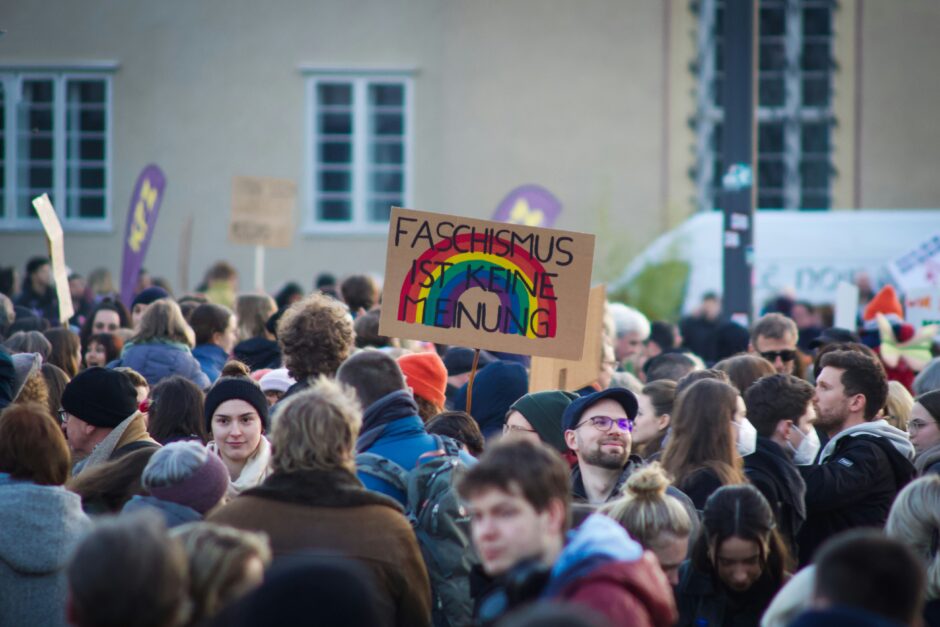On 1 September 2024, two state elections took place in Germany – and their results are historical. For the first time in the history of the Federal Republic of Germany, a party that is partially classified as right-wing extremist has won a state election. And while that is extremely terrifying, it’s not surprising. But who is this party and why exactly are they dangerous? Why are people voting for them? And what does this mean moving forward?
What happened?
Elections took place in both Saxony and Thuringia, states in East Germany (i.e. the former German Democratic Republic under Soviet occupation). As of September 2, 2024, these are the results (subject to change): In Saxony, the conservatives (“CDU”) got 32% of the votes, making them the strongest force, and the right-wing extremist party “AfD” (“Alternative for Germany”) came in second with 31% (source). In Thuringia, the conservatives got 24% and the AfD, with their historical win, 33%, making them the strongest force (source).
Who is the AfD?
In Germany as a whole, the AfD is classified as a ‘suspected case’ of right-wing extremism and in both Thuringia and Saxony (as well as Saxony-Anhalt) they have officially been classified as right-wing extremist (source). This classification is done by the so-called ‘Verfassungsschutz’, the ‘Federal Office for the Protection of the Constitution’. Being considered as definitely right-wing extremist is the third and final stage and it takes quite a lot to get there. AfD politicians such as Björn Höcke (state party leader in Thuringia) have glorified Hitler and the Third Reich with quotes like “The problem is that Hitler is being portrayed as evil.” (source). Just a few months ago, Björn Höcke was in court for using a Nazi slogan in a speech (source) – and that was not the first time he’s been in court. In 2018 the AfD drafted a bill to ban same-sex marriage (source), after it had been legalized in 2017. In their current programme, they have suggested ‘strengthening’ the ‘traditional family’ (AfD’s general program, see p. 41) and, of course, they constantly highlight how immigrants, refugees, and asylum-seekers are supposedly a huge problem in all ways possible (see, for example, here). In other words, they’re blatantly racist, xenophobic, islamophobic, antisemitic, queerphobic, misogynistic and anti-democratic.
Earlier this year, an independent newsroom (“CORRECTIV”) uncovered a secret meeting between neo-Nazis, AfD politicians, and businesspeople, in which they discussed the mass deportation of millions of people living in Germany (whoever they have deemed as not-German) and how to make that plan a reality (read the full article in English here). The release of this article made headlines everywhere and was followed by dozens of demonstrations all over Germany. Hundreds of thousands of people protested in the streets and petitions attempting to get the AfD banned quickly garnered signatures.
All of this would create the impression that nobody wants the AfD to gain power and hence, nobody would vote for them. In fact, all other major parties, including the conservatives, have stated that they will not form a coalition with them (source and conservatives’ official statement from 2018). Over the years, and especially in recent times, support for the AfD has certainly diminished… right?
Why do people vote for them?
A common argument on why people vote for the AfD has been that they’re angry and disappointed in the current government (consisting of the social democrats, the liberals, and the green party). And that disappointment is certainly true for the majority of the people in Germany. Especially the current chancellor, Olaf Scholz, is not exactly well-liked. However, this narrative has been created in which AfD voters are these naive, stupid people who don’t know what they’re doing. Especially East Germans are being portrayed as children throwing a temper tantrum. It’s easy to put the blame for the election results on temporal external factors and forget that there is an actual problem with the rise of the far-right. Of course there are AfD voters who are just angry and naive and don’t know what they’re doing. But that is not the majority. In fact, according to a study from 2023, one in twelve people in Germany shares a right-wing extremist worldview (source). We shouldn’t pretend that with a different government or without the Ukraine war, this would all go away. After all, the AfD was already the second strongest force in Thuringia at the last election in 2019 (source). At that time, there was a different government, Angela Merkel was still chancellor, there was no pandemic, no economic crisis, and no Ukraine war. So how could all of that possibly carry the sole responsibility? Let’s not forget about the 22% that voted for the AfD (source) before they could use all of that as an excuse. To be clear, I’m not saying that all AfD voters are right-wing extremists. However, they know exactly who they’re voting for. We shouldn’t pretend like people don’t know what the AfD is all about – they do, they just don’t care. So while not all AfD voters are far-right extremists, they’re all supportive of far-right ‘solutions’ to their problems. Even if the AfD would actually fix the lives of the lower and middle class (they would not, but that’s another story), everything else that they do would still be far-right extremism. Voting for the AfD means supporting all of what they are, not just parts of it, and therefore it means supporting and accepting far-right extremism.

What happens now?
In Thuringia, the AfD now has over a third of the seats (for the first time ever), which means that they have the power to block decisions that require a 2/3 majority. This is needed, for example, for making changes to Thuringia’s constitution (to clarify: Germany as a whole has a constitution and in addition to that all 16 states have their own constitution) and electing judges for Thuringia’s constitutional court. A 2/3 majority is also needed for the dissolution of the state parliament which would lead to new elections. This might seem unlikely to happen, but can occur if there are no permanently stable majorities. Additionally, as the strongest force, the AfD has the right to suggest someone as president of the state parliament. Having this role would attribute them even more power. It’s probable that the other parties will not vote for the AfD’s candidate and instead suggest someone else. However, this vote is anonymous and it is possible that, for example, a few conservatives will vote for said candidate – and that might be enough (source).
Overall, this means that the other parties will be forced to cooperate with the AfD in one way or another. The AfD now has a lot of leveraging power, so they could, for example, agree to tolerate change x to Thuringia’s constitution and not block it, but in exchange for that, ask the other parties for something else. That way, their ideas can still become realities. I would argue that this is the best position the AfD could have asked for. They have quite a lot of power but at the same time they will (in all likelihood) not be a part of the government, which means that they don’t have to deliver on any of the promises they made to their voters. They can continue to blame everything on the government and say that they would do things differently if only they had the chance. This is exactly what might serve them well next year, when Germany’s new government will be elected. In that sense, it’s unfortunate that the AfD is not governing in Thuringia – because they don’t have the chance to fail in fulfilling their promises, nobody can be disappointed in them. Hence, the people that have voted for them now or in the past, might do so again for that reason. However, overall it’s very difficult to predict next year’s elections because the results of two East German states cannot be accurately projected onto the entire country. But if the current trend continues, the AfD’s success will only increase. During the last election (in 2021), climate change was the most impactful issue – now it’s immigration. How that will impact the election remains to be seen.

Final Note
At the end of the day, does all of this really matter? It feels like after every election we try to explain all these different reasons for how we ended up here and why people are unhappy and angry. There’s always an excuse. Don’t get me wrong, of course we need to take people’s concerns and fears seriously but nothing will ever be a valid excuse to support far-right ideologies and we need to stop pretending that there is. When the AfD has power and influence, like they do now, it doesn’t matter how they got it. The problem is that they have it. History repeats itself and we all know what can happen if we give them a chance to make decisions.





